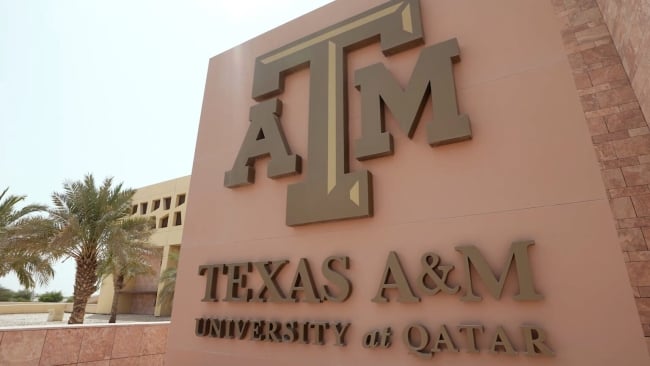You have /5 articles left.
Sign up for a free account or log in.

Texas A&M’s campus in Doha, Qatar, will cease operations by 2028 after a surprise vote by the system’s Board of Regents.
Texas A&M University
The Texas A&M system Board of Regents voted last Thursday to close their branch campus in Doha, Qatar. No incoming class will be admitted for this fall, according to a system spokesperson, and the campus will cease operations by 2028.
The decision comes just three years after Texas A&M renewed its 10-year contract with the Qatar Foundation, a state-sponsored nonprofit that partners with many international universities to operate satellite campuses in the Persian Gulf country. There was no public discussion of the issue at the board meeting; the vote for closure was introduced and finalized in less than a minute.
It was an abrupt and unceremonious end to a 21-year partnership worth hundreds of millions of dollars—and, some say, a harbinger of future challenges for international branch campuses in a politically charged environment.
System spokesperson Mike Reilly said the decision was made due to regional instability and changing institutional priorities, but many are skeptical of that rationale—especially since the vote was held two months after a splashy report accused Texas A&M of sharing sensitive nuclear energy and weapons development research with the Qatari government.
Faculty members living and working in Doha are devastated by news of the closure.
Brittany Bounds, a history professor at TAMU Qatar, said the decision was “absolutely shocking.” When the vote passed in Texas, it was the middle of the night in Qatar, and Bounds woke up to “hundreds of messages” from sympathetic friends in College Station and panicked colleagues in Doha. Most faculty members in Qatar are on year-to-year contracts; Bounds said the university sent an email guaranteeing extensions for at least another year, but that did little to assuage their concerns.
“I felt kicked in the gut … Most people here, we live in Doha, we’ve built lives here; even if there is a landing pad in Texas, many of us have no desire to go there,” she said. “It felt like losing a family member and having to grapple with that. Now we’re coming out of the shock of it and asking, what do we do?”
‘Something Doesn’t Add Up’
In a statement after the vote, Board of Regents chairman Bill Mahomes chalked up the decision to a question of priorities.
“The Board has decided that the core mission of Texas A&M should be advanced primarily within Texas and the United States,” he wrote. “By the middle of the 21st century, the university will not necessarily need a campus infrastructure 8,000 miles away to support education and research collaborations.”
TAMU’s erstwhile partners say that’s bunk. A Qatar Foundation spokesperson said the organization was blindsided by the vote and blamed it on a “disinformation campaign” that successfully targeted regents.
The spokesperson is referring to a report issued by the Institute for the Study of Global Antisemitism and Policy in December, which accused Texas A&M of licensing nuclear energy and weapons development research to its Qatari partners—who in turn, ISGAP implied, were funding and arming Hamas, the Palestinian militia group that carried out the Oct. 7 terrorist attacks in Israel. After the vote, ISGAP’s president commended the Board of Regents for their “courageous and morally principled stance.”
When the report was released, system president Mark Welsh disputed many of its claims and vehemently rejected the findings, which he called “false and irresponsible.” Reilly, the system spokesperson, reiterated that stance this week in an email to Inside Higher Ed, writing that “the misinformation campaign had no bearing” on the vote. Multiple regents did not respond to requests for comment.
“Thursday’s decision by the Board of Regents … was made following a close analysis of the university’s mission and the evolving political situation in the Middle East,” Reilly wrote. “Discussions about branch and remote campuses are ongoing and were underway long before false information was reported.”
Those on the ground in Doha aren’t buying it. Bounds said that TAMU Qatar administrators and faculty discussed the ISGAP report at length at a Faculty Senate meeting held a week before the board vote, and while she didn’t anticipate it would lead to closure, she knew that even the implication of Hamas ties meant trouble.
“We didn’t have any problems until the ISGAP report came out,” she said. “We anticipated the board would have questions about this and hoped for a discussion, but they just came out with the vote like it was prearranged.”
Kyle Long, founder and director of Global American Higher Education, a coalition of researchers studying American institutions abroad, said the university’s comments about growing instability in the region were confusing, considering the campus was established in 2003, an arguably more volatile time in the region: in the early months of the Iraq War, when the fallout from the Sept. 11 attacks was still shaking U.S. relations in the Middle East.
“Something doesn’t add up here,” he said. “I think we’re only getting a very small fraction of what’s going on under the surface.”
The decision is also a costly one for A&M, as the university’s contract with the Qatar Foundation has been incredibly lucrative. Details on the newest agreement are sparse and closely guarded; university officials refused an Inside Higher Ed public records request for the contract, going so far as to appeal to the Texas attorney general’s office to keep it secret. But the last 10-year contract was worth more than $750 million, according to a 2016 Washington Post investigation.
Long believes the closure likely has more to do with politics than the board is letting on, especially as colleges and universities face heightened scrutiny over the Israel-Hamas conflict.
“It’s amazing. They’re going to give that subsidy up because, in their calculation, it’s better to forfeit the money and not have this headache,” Long said. “Is the governing board reading the political tea leaves here and trying to avoid attracting scrutiny? I think that’s more likely than the reasons they’re giving.”
TAMU’s Qatar campus has faced controversy and scrutiny before, but largely from within. In 2022 system leaders announced a major reorganization plan, which drew criticism from faculty who believed it would undermine academic freedom.
Even before that, Joseph Ura, former chair of the Qatar campus’s liberal arts program, had his own academic freedom issues. In 2021, he said, a former professor’s contract was not renewed after she tweeted pro-Israel sentiments and faced retaliation; when he stood up for her, he was removed from his chair position by Qatar campus dean Cesar Malave. Ura is currently engaged in a lawsuit with Texas A&M after its internal investigation found no evidence of discrimination or retaliation—in contrast to an independent investigation by the U.S. Equal Employment Opportunity Commission, which sided with Ura.
Even factoring in growing concerns around academic freedom and independence in Doha, Ura was “stunned” by the board’s decision.
“Things had settled into an equilibrium by the time I left,” said Ura, who departed A&M last year and is currently a political science professor at Clemson University. “The process for negotiating this new contract was very long and involved, and the fact that the board just pulled the plug is wild.”
The First Domino?
TAMU Qatar is just one of many American branch campuses that make up Education City, the “multiversity” in Qatar that also includes branches of Virginia Commonwealth, Georgetown, Carnegie Mellon and Northwestern Universities and Cornell’s Weill School of Medicine. TAMU Qatar, opened in 2003, was one of Education City’s first tenants.
Long compared TAMU Qatar’s closure to Florida International University’s decision earlier this year to end its partnerships in China—including a highly successful branch campus in Tianjin. In Florida, as in Texas, he suspects conservative politics played a decisive role.
“When these agreements were made [in the early 2000s], higher education occupied a very different place in American political life,” he said. “Now institutions are much more centrally located in our political discourse and therefore are subject to more scrutiny about even the minor details of their operations, let alone those that have implications for foreign policy.”
Most of the Qatar Foundation’s American partners are private rather than public institutions, and they aren’t subject to the same pressures as TAMU—with the exception of VCU. But as global higher ed initiatives become more politically fraught, Long suspects their appeal will start to diminish for international partners as well.
“Are the international partners prepared for what these joint ventures will take to maintain going forward?” he said. “In the 2000s these partnerships were built on the premise that they were a closed system. Now, you need not only to manage faculty and students, but also lobbyists and state politicians … it’s a much bigger undertaking.”
Long said plenty of international higher education professionals and researchers are crying apocalypse at the TAMU Qatar news. He wouldn’t say the end is nigh for international branch campuses, or even campuses in the Middle East; just a few weeks ago, Baylor College of Medicine, another Texas-based institution—albeit a private one—announced it was opening a branch campus in Dubai. But he acknowledged that the ground is shaky.
“Is the sky falling? I don’t think so. But it is increasingly unstable. And the theory that this is the first domino to fall in Education City is not far-fetched,” he said. “You’d think over 20 years [Texas A&M] would have planted some strong roots in Doha, but when the soil is continually tilled by political headwinds, everything is up in the air.”





